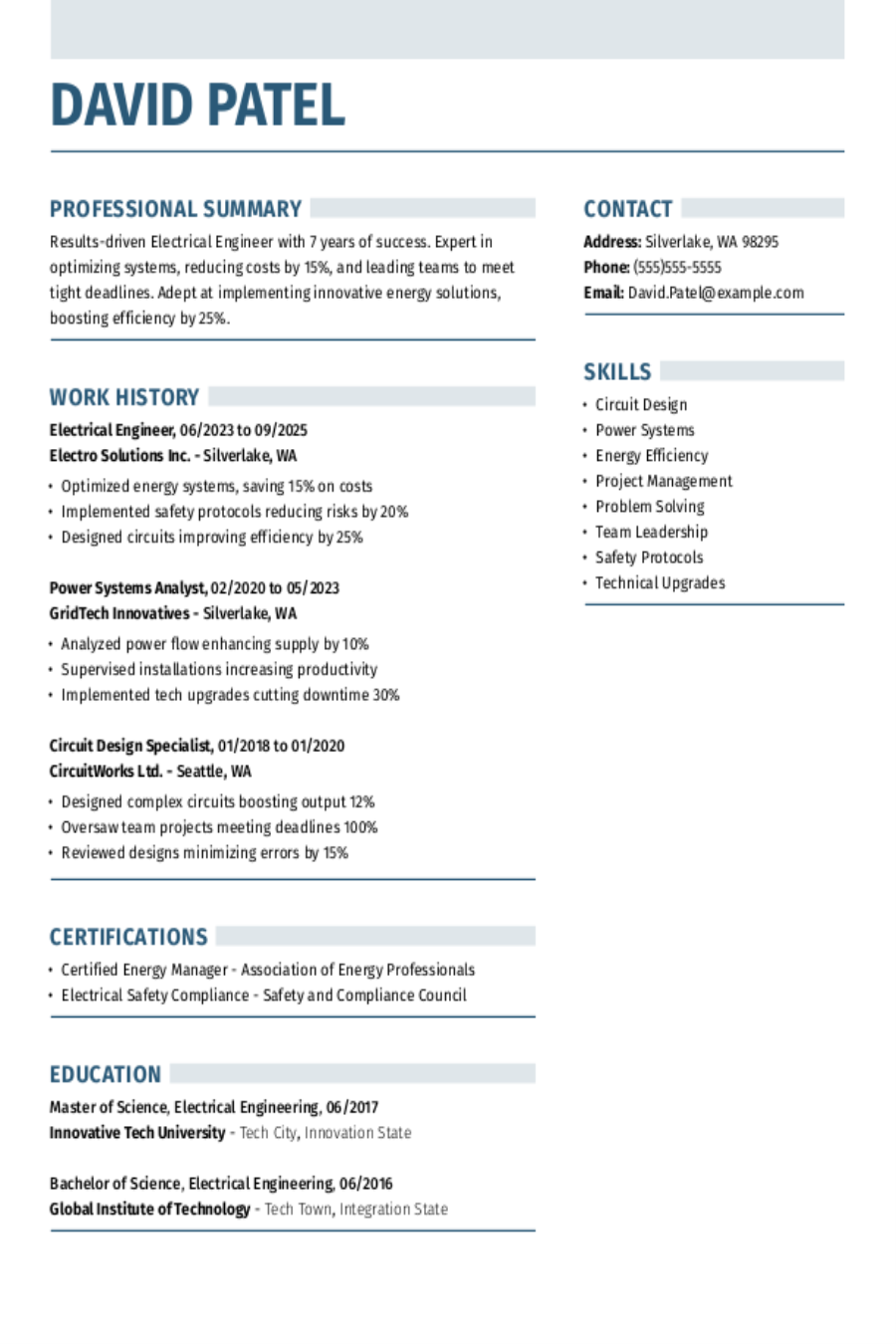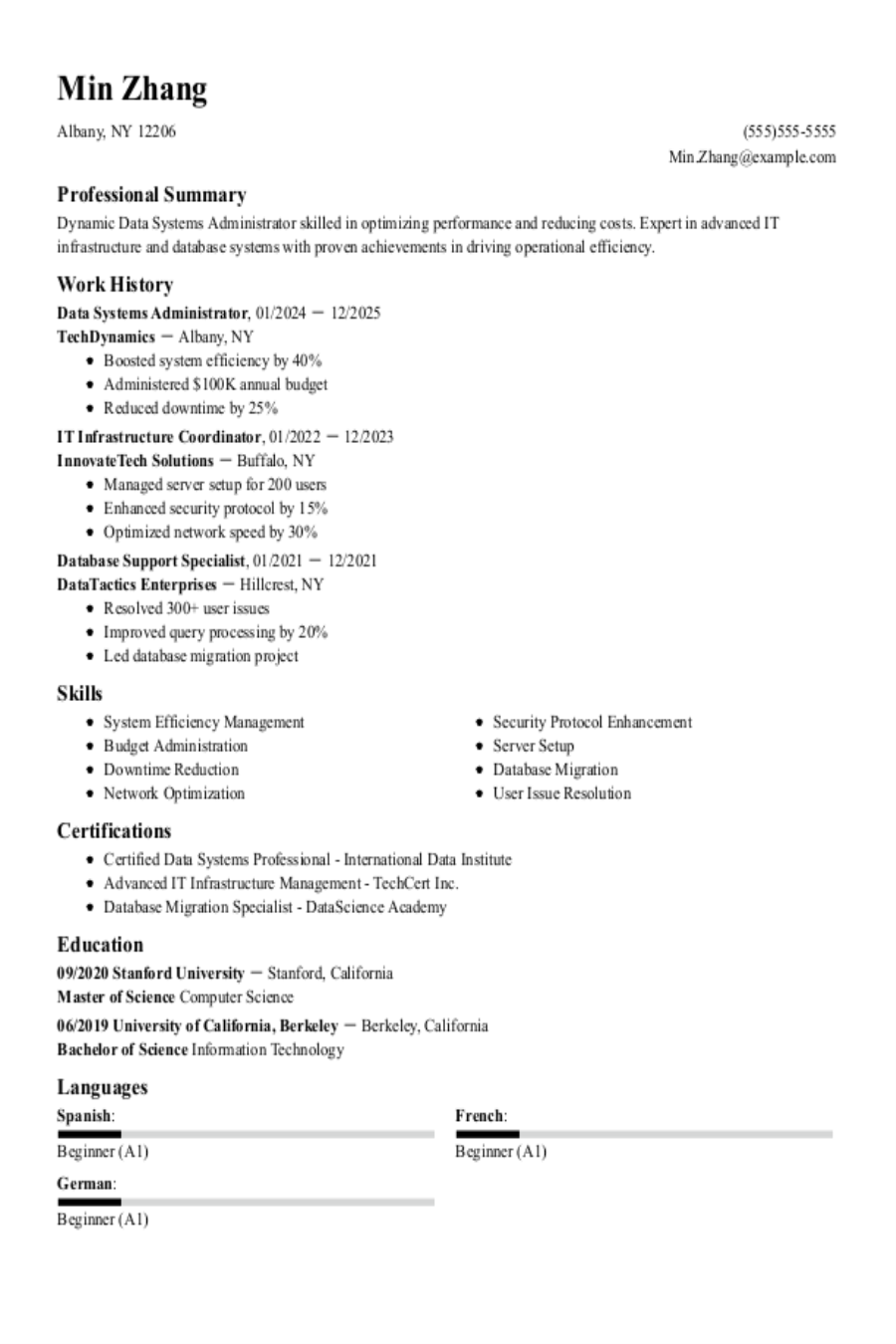Popular IT Resume Examples
Entry-level IT resume
An entry-level resume for IT should focus on relevant technical skills, certifications, projects, and internships to show capability and readiness for a professional role despite limited experience.
Showcases education: This resume builds the candidate’s credibility by placing a strong focus on their educational background, establishing their expertise despite limited experience. This demonstrates a strong commitment to professional development in IT security and cloud administration.
Prioritizes readability: Choosing a clean and straightforward layout, like a simple resume template, ensures that your qualifications stand out. This format allows recruiters to quickly scan and recognize your relevant skills and achievements.
Mid-career IT resume
A mid-career IT professional's resume should emphasize a combination of technical expertise, relevant project experience, and evidence of continuous learning to effectively demonstrate growth in the industry.
Includes mix of skills: This resume effectively highlights a mix of technical expertise and interpersonal skills, showcasing the applicant's comprehensive ability to drive IT projects while fostering collaboration and support within teams.
Begins with a powerful summary: This resume's professional summary highlights essential qualifications, showcasing the job seeker's expertise in IT and proven successes. This clarity aids recruiters and ATS in swiftly pinpointing relevant experience.
Experienced IT resume
An experienced IT professional's resume should highlight technical skills and project achievements to clearly demonstrate career growth and expertise.
Highlights experience: The resume summary immediately highlights the job seeker’s 11 years of experience in IT, showcasing expertise in system management and leadership. This sets a professional tone, underscoring key achievements like system upgrades and security enhancements.
Embraces modern design: This modern resume template effectively showcases the applicant's innovative problem-solving skills and commitment to excellence, emphasizing their ability to lead successful projects and improve IT systems.
No experience IT resume
A resume for an applicant with no experience should emphasize transferable skills, relevant coursework, and volunteer work to demonstrate potential and enthusiasm for the role.
Overcomes lacking experience: Including volunteer work improves this resume by showcasing practical skills and commitment, offering valuable insights into a job seeker’s abilities beyond formal employment.
Uses a simple style: The resume's clean layout effectively highlights qualifications through organized sections, making it easy to see relevant experience and skills at a glance.
More resume examples
IT Resume Template
Looking for a great way to showcase your skills? This IT resume template is an ideal starting point—just personalize it with your own details and make it shine.
Emily Wilson
Riverside, CA 92504
(555)555-5555
Emily.Wilson@example.com
Professional Summary
Experienced IT professional with 7+ years in system optimization, cloud infrastructure, and data security. Proven record in reducing downtime and operational costs while delivering cutting-edge solutions. AWS certified and skilled in project management and troubleshooting.
Work History
IT Specialist
TechNova Solutions - Riverside, CA
February 2022 - November 2025
- Reduced system downtime by 30% through optimizations
- Managed budgets for upgrades worth $250,000 annually
- Implemented cloud solutions improving efficiency by 25%
Systems Administrator
DigitalEdge Networks - Lakeside, CA
January 2018 - January 2022
- Maintained 99.9% uptime for server infrastructure
- Optimized storage systems saving 15% operational costs
- Supervised team of 8 engineers on new deployments
Technical Support Engineer
BrightWave Technologies - San Diego, CA
January 2016 - December 2017
- Resolved 500+ support tickets monthly with 98% satisfaction
- Created knowledge base reducing query times by 40%
- Streamlined troubleshooting processes enhancing speed
Skills
- System Optimization
- Cloud Infrastructure
- Network Administration
- Data Security
- Troubleshooting Expertise
- IT Project Management
- Team Collaboration
- Technical Documentation
Certifications
- AWS Certified Solutions Architect - Amazon Web Services
- CompTIA Security+ - CompTIA
- Microsoft Azure Administrator Associate - Microsoft
Education
Master of Science Information Technology
Stanford University Stanford, California
May 2016
Bachelor of Science Computer Science
University of Washington Seattle, Washington
May 2014
Languages
- Spanish - Beginner (A1)
- Mandarin - Intermediate (B1)
- French - Beginner (A1)
Writing Your IT Resume
Having explored these effective resume examples, you are now prepared to dive into the process of how to write a resume. We will walk you through each section in detail, ensuring you understand every step along the way.
List your most relevant skills
An effective skills section on your IT resume is important for showcasing both technical competencies, such as programming languages and software skill, along with soft skills like teamwork and analytical thinking.
Make sure to carefully analyze job listings and incorporate relevant keywords from the job listing into your skills section. This strategy not only helps human recruiters quickly identify your strengths but also ensures that applicant tracking systems recognize you as a suitable applicant. Tailoring your skills in this way can significantly improve your chances of landing an interview in the competitive IT field.
Example of skills on an IT resume
- Proficient in managing IT projects using Agile methodologies
- Adept at troubleshooting hardware and software issues efficiently
- Strong communicator with the ability to collaborate across teams
- Analytical thinker with a focus on improving system performance
Highlighting your soft skills on your resume can set you apart from other job seekers. Employers greatly value interpersonal abilities, as they are often harder to develop than technical skills, making them a significant asset in any workplace.
Highlight your work history
A strong work experience section should highlight your achievements and explain how you’ve applied your technical skills to solve real-world problems, rather than just listing tasks. Use industry-specific keywords that will catch the attention of hiring managers to emphasize the impact of your work.
Each job entry must include key details: your job title, employer's name, and employment dates. Providing this information helps employers quickly grasp your career timeline and assess your professional background.
Example of an IT work experience entry
- IT Specialist
Tech Solutions Inc. - Dallas, TX
January 2021 - Present - Diagnose and resolve over 150 technical support tickets weekly, achieving a 97% first-contact resolution rate
- Deliver exceptional user support by training employees on new software applications, improving overall productivity by 15%
- Implement IT security measures that resulted in a 30% reduction in security incidents within the department
- Collaborate with cross-functional teams to streamline processes and improve system performance, leading to more efficient workflows
- Maintain detailed documentation of troubleshooting procedures and user guides, contributing to a comprehensive knowledge base for future reference
Focus on crafting bullet points that highlight your achievements with quantifiable results, ensuring each point is concise and effective without overwhelming details.
Include your education
The education section of your IT resume should be organized in reverse-chronological order, starting with your most recent degree or certification. Include details such as the name of the institution, degree earned, and graduation date. If you have a bachelor's degree or higher, it is appropriate to omit your high school diploma.
If you are currently studying or have not yet completed a program, list the highest level of education achieved along with your expected graduation date. You can improve this section by including bullet points that highlight relevant coursework, projects, or honors received during your studies.
Common certifications for an IT resume
- CompTIA A+ Certification – CompTIA
- Cisco Certified Network Associate (CCNA) – Cisco Systems
- Microsoft Certified: Azure Fundamentals – Microsoft
- Certified Information Systems Security Professional (CISSP) – ISC²
Sum up your resume with an introduction
The profile section of your resume is important in making a strong first impression. It serves as the initial snapshot of your qualifications, giving potential employers insight into your professional identity and what you bring to the table.
For experienced applicants, a professional summary is often the best choice. This format allows you to showcase significant achievements and relevant skills right at the top of your resume. If your background is limited, include a goals-based resume objective that reflects your dedication to learning and development.
Professional summary example
Results-driven IT professional with over 10 years of experience in optimizing network infrastructures and improving cybersecurity measures. Demonstrated success in implementing innovative technology solutions that improve system performance and reduce downtime. Highly proficient in cloud computing, data management, and cross-functional team collaboration.
Resume objective example
Enthusiastic IT support specialist eager to use strong problem-solving and communication skills to improve user experience in a fast-paced tech environment. Committed to learning and applying new technologies while providing effective troubleshooting assistance to improve overall system efficiency.
Crafting your IT resume profile is an important step. By incorporating specific keywords from the job description, you ensure your resume passes ATS filters. This strategic approach highlights your qualifications from the start, making you stand out to potential employers.
Add unique sections to set you apart
Improve your resume by including optional sections that highlight your unique qualifications for IT positions. These sections allow you to stand out and showcase what makes you a valuable job seeker.
By integrating relevant hobbies or volunteer experiences into your resume, you provide insight into your professional character. Employers appreciate seeing how you spend your time outside of work, especially when it aligns with the skills needed in IT. Whether it's contributing to open-source projects or leading tech workshops, these activities reflect not only your expertise but also your commitment and passion for the field.
Three sections perfect for a it resume
- Technical Skills: Technical skills are important on your resume as they demonstrate your ability to perform specific tasks and use relevant tools. Highlighting these skills can set you apart from other job seekers and showcase your readiness for the role.
- Tools and Platforms: In today's IT landscape, computer skills are essential for efficiency and productivity. Having familiarity with software tools, programming languages, and collaboration platforms can significantly improve your ability to solve problems and innovate in your role.
- Professional Certifications: Certifications showcase your dedication to professional growth in technical roles. Highlight relevant certifications, including the organization and completion date, to improve your credibility and job opportunities.
5 Resume Formatting Tips
- Choose a format that matches your career stage.
Choose a resume format that fits your experience level: If you're seasoned, go for chronological. Starting out? The functional style highlights skills. Combine both for a versatile approach.
- Pick a smart resume template.
Using a professional resume template improves readability and streamlines formatting, allowing your key information to stand out at a glance. If you prefer a custom layout, keep it clean and select ATS-friendly fonts to ensure your resume passes through automated screenings effortlessly.
- Select an appropriate font.
To improve your resume's readability, opt for a clean professional font. Fonts like Helvetica, Georgia, or Verdana are effective for both applicant tracking systems and hiring managers.
- Use consistent formatting.
Align your resume text to the left and maintain uniform margins for a polished and professional look that improves readability.
- Keep your resume to one or two pages.
When outlining your resume, remember that resumes should be one page long. If you have extensive experience, consider extending it to two pages, but ensure every word counts and focuses on your key achievements.
Tools for Your Job Search
Are you gearing up to apply for that exciting IT position? Before you hit the submit button, consider using our ATS Resume Checker. This tool provides insights on how your resume measures up against the automated systems that many tech companies use for initial applicant screening.
Want to take your application a step further? Our AI Resume Builder is designed specifically for professionals in IT. It offers tailored recommendations and features professionally crafted templates that effectively showcase your technical skills and experiences to potential employers.
Frequently Asked Questions
Last Updated: November 22, 2025
Absolutely. A cover letter is important because it adds depth to your resume and allows you to communicate directly with potential employers. This is your chance to convey what excites you about the IT role and how your experience makes you a perfect fit. So, don’t overlook this opportunity—write a cover letter that improves your application.
For an easier approach, consider using our AI Cover Letter Generator. It lets you create tailored, job-winning cover letters in just minutes. Plus, you'll find a variety of cover letter template options that match your resume beautifully, ensuring consistency across your job application materials.
A resume is typically a concise document, spanning one to two pages, focusing on your work experience and relevant skills. In contrast, a CV (curriculum vitae) can extend several pages and provides detailed information about your academic background, research contributions, publications, and professional experiences.
You should use a CV when applying for roles in academia or specialized fields like law or medicine. If you need to create a tailored CV efficiently, our online CV Maker is perfect for you. Choose from a variety of professionally designed CV templates suited for different industries and career levels to make an impressive first impression.
A frequent pitfall for IT professionals is using a resume that fails ATS screening. To improve your chances, choose a resume template that's ATS-friendly and tailor your resume to align with the specific job description. This small adjustment can significantly boost your visibility to potential employers.
To create an effective skills section for your IT resume, mix technical skills like programming languages and software skill with soft skills such as problem-solving and teamwork. In your experience section, illustrate how these skills led to significant project successes or improvements within your previous roles.
An active LinkedIn profile is important for any IT professional seeking job opportunities. It allows you to network effectively and highlight your technical skills to potential employers.
To boost your networking skills, regularly reconnect with past colleagues and attend industry events. Joining professional organizations related to IT can provide valuable connections. Don’t forget to keep your LinkedIn profile current, as it’s a great way to engage with peers and stay informed about trends in the tech field.
Was this information helpful? Let us know!
Hailey is a career advice writer dedicated to helping job seekers excel in their careers.
More resources

How to Write a CV: The Ultimate Guide
Here is a complete and comprehensive guide to writing a CV ev...

15 Latest Resume Trends for 2026 + Examples
In our dynamic global economy the job market and the expectat...

Electrical Engineering Resume: Examples & Templates
As an electrical engineer you need a resume that showcases yo...

Electrical Resume: Examples & Templates
As an electrical professional you need a resume that captures...

Data Systems Administration Resume: Examples & Templates
As a data systems administrator you need a resume that showca...


